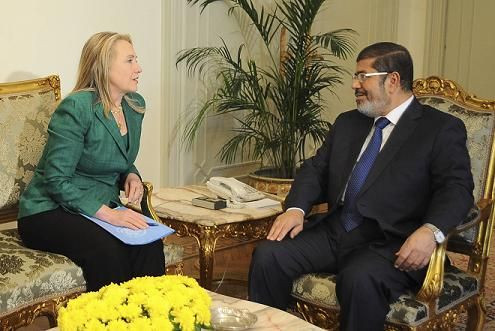Gaza Conflict Tests U.S.-Egypt Alliance

The mounting death toll in Gaza offers the latest test of the U.S.-Egyptian relationship in a reshaped Middle Eastern political landscape.
Egyptian president Mohamed Morsi has been leading negotiations for a cease-fire, reached Wednesday after days of negotiations, but he has been unrestrained in labeling the conflict an act of unwarranted Israeli aggression. Egypt pulled its ambassador from Israel after Operation Pillar of Defense began last week.
For decades, U.S. policymakers have viewed the alliance between Israel and Egypt as a cornerstone of regional security. The United States has encouraged Egypt with billions of dollars in annual military aid, and the United States has an interest in Egypt maintaining its role as a regional mediator.
In a White House press briefing, national security adviser Ben Rhodes commended the “cooperation and the consultation we’ve had with the Egyptian leadership.”
“Egypt has been a critical part of our effort to manage that conflict and pursue peace,” Rhodes said. “That was the case under President Mubarak. It continues to be the case under President Morsi, who has upheld the peace treaty with Israel.”
But Rhodes stressed that any peace had to be contingent on Hamas halting rocket attacks on Israel, endorsing Israel’s justification for the bombardment. That conflicts with widespread pro-Palestinian sentiment in Egypt, where the Arab Spring brought to power an Islamist-influenced government that is more sympathetic to the Palestinian cause.
Despite condemning the Israeli operation in Gaza, Morsi’s government has sought to project leadership that would cement its role as a shield against strife. Prolonging the conflict “could have negative repercussions on the security and stability of the region,” foreign minister Mohamed Kamel Amr said in a statement.
The Muslim Brotherhood and the smaller Al-Nour party, affiliated with the more conservative Salafist brand of Islam, have been vehemently critical of the operation. The Muslim Brotherhood’s Freedom and Justice Party, which fielded Mursi’s presidential candidacy, has called for Egypt to suspend relations with Israel and assess their peace treaty.
“Revolutionary Egypt is no longer a strategic treasure for the enemy and is now biased to and supportive of Arab citizens everywhere, especially the Palestinians,” Freedom and Justice Party president President Mohamed Saad Al-Katatni said in a statement. “Political parties and forces call on the Egyptian government to take concrete steps to stop the Zionist assault on the besieged Palestinian people in the Gaza Strip.”
Persecuted but tolerated in Mubarak’s Egypt, the Muslim Brotherhood has transformed from the country’s leading opposition party into its most potent political force. The White House has made diplomatic overtures to the party, a thaw compared to the years in which the United States viewed the Brotherhood warily given its religious conservatism and role in producing radical offshoots like Hamas.
If Israel’s attack on Gaza spurs another push for Palestinian statehood, the U.S. could find itself at odds with Egypt. The Pakistani Express Tribune reported that Mursi has sought to enlist Pakistan’s help in supporting the Palestinians’ bid for elevated status at the United Nations. The United States cut off funding to the United Nations Educational, Cultural and Scientific Organization in 2011 after U.N. delegates approved Palestinian membership in UNESCO despite objections from the U.S. and Israel.
America’s relationship with Egypt suffered last year during a dispute over American non-governmental organization workers whom Egypt detained, claiming they were working illegally to encourage regime change. The United States threatened to withhold assistance, but Secretary of State Clinton ultimately approved an $1.3 billion aid package after Egyptian authorities allowed the arrested Americans to post bail.
Clinton waived newly passed restrictions requiring that aid to Egypt be contingent on democratic reforms, angering lawmakers who said the ruling military council had been exhibiting autocratic tendencies and suppressing dissent. The Supreme Council of the Armed Forces later dissolved Egypt's newly elected parliament -- the first of the post-Mubarak era -- enforcing a ruling from the country's High Constitutional Court.
© Copyright IBTimes 2024. All rights reserved.





















